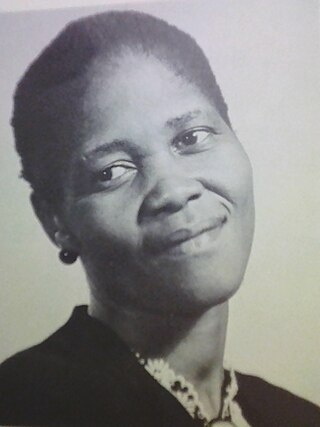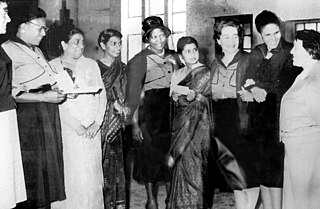This article needs additional citations for verification .(July 2023) |
| |||||
| Decades: | |||||
|---|---|---|---|---|---|
| See also: | |||||
The following lists events that happened during 1956 in South Africa.
This article needs additional citations for verification .(July 2023) |
| |||||
| Decades: | |||||
|---|---|---|---|---|---|
| See also: | |||||
The following lists events that happened during 1956 in South Africa.

The Defiance Campaign against Unjust Laws was presented by the African National Congress (ANC) at a conference held in Bloemfontein, South Africa in December 1951. The Campaign had roots in events leading up the conference. The demonstrations, taking place in 1952, were the first "large-scale, multi-racial political mobilization against apartheid laws under a common leadership".

Lilian Masediba Matabane Ngoyi, "Mma Ngoyi", OMSG was a South African anti-apartheid activist. She was the first woman elected to the executive committee of the African National Congress, and helped launch the Federation of South African Women.

Helen Beatrice Joseph OMSG was a South African anti-apartheid activist. Born in Sussex, England, Helen graduated with a degree in English from the University of London in 1927 and then departed for India, where she taught for three years at Mahbubia School for girls in Hyderabad. In about 1930 she left India for England via South Africa. However, she settled in Durban, where she met and married a dentist, Billie Joseph, whom she later divorced.

The Treason Trial was a trial in Johannesburg in which 156 people, including Nelson Mandela, were arrested in a raid and accused of treason in South Africa in 1956.
Events from the year 1962 in South Africa. This year is notable for its internal and international resistance campaigns against the country's Apartheid legislation. Umkhonto we Sizwe, the militant wing of the African National Congress, made its first sabotage attacks in 1961, and Nelson Mandela traveled to Ethiopia to rally support for Umkhonto and justify the attacks. Nelson Mandela was sentenced to jail for 5 years upon returning to South Africa for illegally leaving the country. The international sporting community also showed its displeasure with the government's laws. FIFA suspended South Africa in 1962 for fielding an exclusively-white South African national football team, forcing South African football authorities to add black players to the team. The government, in turn strengthened methods of enforcing Apartheid, and the Robben Island prison was made a political prison in 1962.
The following lists events that happened during 1955 in South Africa.
The following lists events that happened during 1963 in South Africa.
The Congress of the People was a gathering organised by the National Action Council, a multi-racial organisation which later became known as the Congress Alliance, and held in Kliptown on 26 June 1955 to lay out the vision of the South African people. The Freedom Charter was drawn up at the gathering, which was statement of core principles of the Alliance and a symbol of internal resistance against apartheid.
Sophia Theresa Williams-de Bruyn OMSS is a former South African anti-apartheid activist. She was the first recipient of the Women's Award for exceptional national service. She is the last living leader of the Women's March.

Internal resistance to apartheid in South Africa originated from several independent sectors of South African society and took forms ranging from social movements and passive resistance to guerrilla warfare. Mass action against the ruling National Party (NP) government, coupled with South Africa's growing international isolation and economic sanctions, were instrumental in leading to negotiations to end apartheid, which began formally in 1990 and ended with South Africa's first multiracial elections under a universal franchise in 1994.
Billy Nair was a South African politician, trade unionist, and anti-apartheid activist. He was a member of the National Assembly of South Africa and a political prisoner in Robben Island.
Amina CachaliaOLB was a South African anti-Apartheid activist, women's rights activist, and politician. She was a longtime friend and ally of former President Nelson Mandela.

Rahima Moosa OLS was a member of the Transvaal Indian Congress and later the African National Congress. She is well known for the role she played in the national uprising of women on 9 August 1956. Moosa was also a shop steward for the Cape Town Food and Canning Workers Union.

The Federation of South African Women (FEDSAW) was a political lobby group formed in 1954. At FEDSAW's inaugural conference, a Women's Charter was adopted. Its founding was spear-headed by Lillian Ngoyi.
Women's March took place on 9 August 1956 in Pretoria, South Africa. The marchers' aims were to protest the introduction of the Apartheid pass laws for black women in 1952 and the presentation of a petition to the then Prime Minister J.G. Strijdom.
Dora Ntloko Tamana OLG was a prominent South African anti-apartheid activist known for her unwavering commitment to social justice and equality. Her life and work were dedicated to challenging the oppressive apartheid regime in South Africa. Her experiences with the injustices perpetrated under apartheid fueled her determination to fight for society where all individuals would be treated equally regardless of race or background. Tamana's efforts contributed to the eventual dismantling of apartheid in South Africa.

Annie Silinga (1910-1984) was a South African anti-pass laws and anti-apartheid political activist. She is known for her role as the Cape Town African National Congress Women's League President, a leader in the 1956 anti-pass Women's March to the Union Buildings in Pretoria, South Africa and the only African woman in the 1956 treason trial in South Africa.
Bertha Mkhize was a South African teacher, who gained legal emancipation as a feme sole operating a business in her own right. As the government began implementing Apartheid in the late 1940s and early 1950s, she joined labor unions and women's organizations, leading demonstrations against the policies of the government. She was arrested twice for these activities and charged in the second incident with treason, but found not guilty of the allegations. When she was forced to give up her business, she became a pioneer in the Baháʼí Faith, embracing its doctrine of equality for all people. She worked to establish twenty-eight Baháʼí communities in KwaZulu-Natal.

Florence Matomela OLG (1910–1969) was a South African anti-pass law activist, communist, civil rights campaigner, ANC veteran, teacher and mother who dedicated her life to fighting against Apartheid laws in South Africa. Matomela was the provincial organiser of the African National Congress Women's League (ANCWL) and vice-president of the Federation of South African Women (FEDSAW) in the mid 1950s.
Lilian Diedericks OLS was a South African activist known as a founding member of the Federation of South African Women.